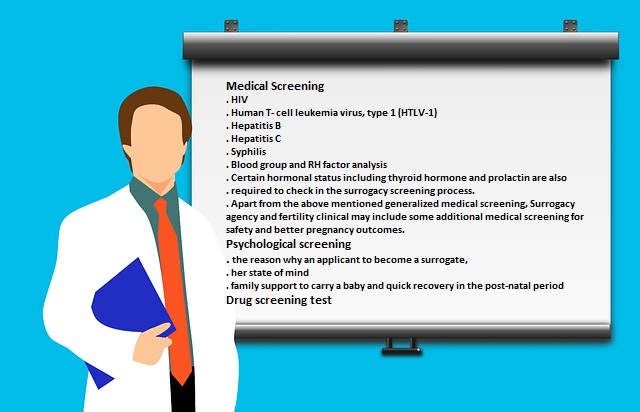The purpose of screening for women who have applied to become a surrogate mother for infertile couples is to ensure that their health and mental state is ready to carry a child for their intended parents.
Surrogacy agencies usually take the responsibility to screen surrogate mothers after thorough assessments of the surrogate application form and the questioner. This helps to evaluate that the applicants meet the basic requirements for surrogacy as per set norms by the surrogacy agency.
The eligibility criteria for surrogacy may differ from country-specific agency to agency. Age, previous maternal history, family support, healthy lifestyle are certain common eligibility criteria for all surrogates.
The age specification may vary. However, 19 to 45 years is the normal age range for surrogates. Most of the agencies prefer women who have their children. This helps to analyze the fertility and childbearing ability and complication if any of the applicants.
There are three steps of the screening process that have followed after the completion of the primary requirement analysis of the surrogates. The steps involve medical screening, psychological testing, and drug tests.
Medical Screening
Medical screening is conducted through some medical tests, which is an essential part of the surrogacy journey. Every fertility clinic has its own set of medical tests, but some basic medical tests are the same for all places.
Evaluation of medical history, physical examination, urine test for the drug, and pap smear test are some initial tests for surrogates. Apart from these tests, blood tests are conducted to screen for serious infections. In some clinics, cervix swab tests are also conducted for checking gonorrhea and chlamydia. Following are some laboratory-based screening tests conducted in every surrogacy:
- HIV
- Human T- cell leukemia virus, type 1 (HTLV-1)
- Hepatitis B
- Hepatitis C
- Syphilis
- Blood group and RH factor analysis are also very important steps in surrogacy screening apart from the evaluation of diseases. These blood tests are conducted for confirmation that the type of the blood of a surrogate will be compatible with the intended father or sperm donor for non-hazardous fertilization and attuned to the fetus.
- Certain hormonal statuses including thyroid hormone and prolactin are also required to check in the surrogacy screening process.
- Apart from the above-mentioned generalized medical screening, Surrogacy agencies and fertility clinical may include some additional medical screening for safety and better pregnancy outcomes.
Psychological screening
Psychological screening is conducted to evaluate the mental state of the surrogate before starts the medical intervention for the surrogacy program. This is conducted by asking multiple interrogative questions by the psychologist/s to check the following points:
- the reason why an applicant to become a surrogate,
- her state of mind
- family support to carry a baby and quick recovery in the post-natal period
Surrogacy requires complete physical, mental, and emotional dedication. Surrogates must realize these requirements at the very initial stage. Honesty and open communication can break any psychological barrier. Therefore, consultation with a psychologist has a great role in the surrogacy journey.
Drug screening test
Drug screening is an essential step for every surrogate mother. Drug addiction has a very harmful impact on developing a fetus. The surrogacy journey aims to give birth to a healthy child and avoid all the possible harm which can hurt the offspring.
Any positive finding of a drug test can reject the application of the surrogate as her eligibility is not considered to carry a baby for the intended parents. However, in special cases, like she takes prescribed opioid pain killer medicine for her dental problem, and test results showed positive findings. Then after the wash period of the drug, she will need to pass the repeat drug screening test before being allowed to proceed.

Ravi Sharma is a self-motivated, successful entrepreneur and has a solid experience in the fertility segment. and he is the director at ARTbaby Global (ARThealthcare). He is a pharmacy graduate with post-graduation in business administration and has 14 years of rich experience in the field of infertility segment. He loves to write about IVF, Surrogacy, and other ART (assisted reproductive technology) news, issues, and updates. He is a Pharmacy graduate (B. Pharm) and M.B.A (marketing).
His most recent success includes the successful launch of the medical tourism company, ARTbaby, which offers treatment options for infertility, egg donation, and surrogacy. He likes spending time with his family and writing about various aspects of IVF surrogacy and donating eggs.

